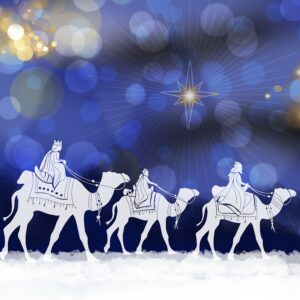
Because I wanted to get off to a riveting start this year, I thought we might begin with a little examination of the genealogy of Jesus. Shall we?
Yes, I know. Some of you are thinking reading through the genealogy is about as riveting as reading through the card catalog. And others of you are now thinking what’s a card catalog? But, come on. It will be fun.
“Abraham was the father of Isaac, and Isaac the father of Jacob, and Jacob the father of Judah and his brothers” – and it goes on for a bit like that.
Typically, genealogies in scripture contain the names of the men in the line of descent – the patriarchs. And there are plenty of them in this list. So many that most readers probably don’t even notice that Matthew has thrown a few women in. Four, to be exact. What women are these? Let me tell you.
Tamar, the woman who posed as a harlot by the side of the road to ensnare Judah, her father-in-law.
Rahab, the prostitute in Jericho who let the spies of Israel hide in her boudoir.
Ruth, the Moabite woman who hustled her way into the family of a prominent Bethlehem man, Boaz.
And the wife of Uriah, also known as Bathsheba, who bore a son for King David while she was married to another man.
Some families want to shove the black sheep of the family tree into the back of the closet, but Matthew puts them right in the middle of the genealogy of Jesus the Christ. You have to wonder: Why are they here? It’s a bit strange.
No sooner do we get past this strangeness in Chapter 1 than we arrive at the scene in Chapter 2 where “wise men” from the east come to pay homage to the newborn king.
It is another mystery, really, that Matthew calls these men wise. Maybe they are knowledgeable about the stars, but they are dangerously naïve about people. They waltz into the court of King Herod, one of the most paranoid and ruthlessly violent kings ever, to ask for directions. “Excuse me, do you know where we might find the newborn king of the Jews? Oh, you’re the king of the Jews? Well, we meant the new king.” What could possibly go wrong here?
At any rate, they manage to get directions, although why they needed them, I don’t know. That star seemed to be as reliable as Google maps. They found Jesus. But I don’t doubt that by the time they did, everyone between Jerusalem and Bethlehem was talking about them. What men are these? They didn’t exactly fit in.
These men from Baghdad, or thereabout, were Magi – magicians. They looked different, they dressed different, they sounded different and acted different. Really, everything about them was different – and by different I mean unacceptable. Yet, here they are with front row seats at the birth of the Jewish Messiah.
They were thoughtful enough to bring gifts – strange gifts, it must be said. I imagine Mary receiving their packages of Frankincense and Myrrh and wondering: Why? Although she didn’t wonder about the gold. That would be useful. Even so, she must have asked herself: What men are these, and why are they here?
Do we wonder? Why are they here? We should.
We might discover that Matthew, in his unique way, is telling us something about who we are.
One thing that concerns me about Christians is this: we have a tendency to talk about who we are in terms of what we are not. We define ourselves in opposition to everyone else in the world. We are not Muslim or Jewish or Hindu or Pagan or Buddhist or Atheist or anything else you can name. We are different from everyone else, we want to say.
And it’s possible that some of the folks in Jesus’ family tree felt that way too. They were acutely aware of who they were not, and who was not one of them. So they gave the side eye to Rahab, that woman who let the Hebrew spies into her room. They turned to their sisters and tsked Ruth when she just showed up in Boaz’s fields all by herself. They gave Bathsheba the back of their hand when she tried to start up a conversation with them at the market.
And when those Magi showed up in their strange headwear and colorful robes, people whispered about those crazy foreigners. Don’t even know where they’re going.
Yet here they are – these crazy foreigners. The welcoming committee as we open the New Testament. Let us show you the way, they say to us.
Then they might show us some of their favorite parts: When Jesus told his disciples that they would have to go to the back of the line if they wanted to be his. When he invited the misfits to sit down at the popular kids table and passed them the bread and wine. He lets them all in. They say, Look – he’s going to turn the world upside down, just like he flipped the money-changers’ tables at the temple.
We call this the Epiphany, which means revelation. The moment when the light bulb goes on and we can see something we couldn’t see before. When these strange characters from out of town came to bow down before the baby Jesus, to show the world who he was and what he would do. He would shake things up and turn things upside down. He would open the gates, tear down the walls and let everybody in. Come to the table. I am the bread of life. I am the cup of salvation.
He would rock our world. He still does.
____________________________________________
Photo from: Churchart.com
